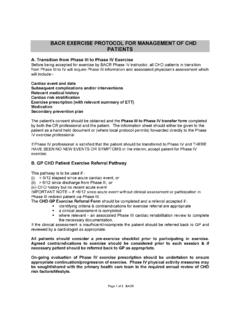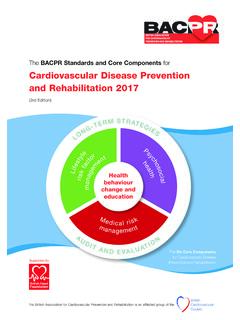Transcription of Cognitive Behaviour Therapy (CBT) self-help for …
1 Cognitive Behaviour Therapy (CBT) self -help for low mood and anxietyDr Chris WilliamsUniversity of GlasgowOverview Depression and chronic illnesses Cognitive Behaviour Therapy (CBT) CBT self -help The current evidence base Some current and chronic disease Depressed mood is common in people with chronicdisease and physical disability (Evans et al, 2005;Anderson et al 2001)It adversely affects Quality of life (Ruoet al 2006) Adherence to treatment (Kronishet al 2006) Clinical outcome (Vieweget al 2006) Depression is costly for the person, their family,employers and does depression affect outcomes Thinking I can t be bothered What s the point?
2 Behaviour : Diet Energy levels/activity Low Motivation/interest in self -management Respond in unhelpful ways drink, eating, ambivalence, self -damaging Underlying shared processes: thyroid, platelet stickiness, variationsin cardiac rhythm, adrenal function, inflammatory processes An approach that addresses thinking/ Behaviour might be helpfulWhy Cognitive Behaviour Therapy ? Evidence based treatment for depressionand anxiety NICE (2006) review: No antidepressants for mild depression Medication or CBT for moderately severedepression Model that helps make sense of things Problem and solution focused Built on a supportive relationship with apractitionerTreating depression improves outcome Case finding and treatment reduces depression (Davidson et al 2006.)
3 Katonet al, 2004) Cognitive behavioural Therapy (CBT) (Davidson et al 2006) Enhanced care (with personal support of a case manager and briefpsychological therapies) are more effective than treatment asusual (Williams et al 2004) But requires relatively intensive resources However, access to CBT is limited Few facilities for US style collaborative care within the NHS. Detecting and managing depression is a priority and is an agreedquality outcome framework measure in the General Practice contractProblems with CBT Waiting lists What is asked when you get there Travel Fears/concerns: let s look around the room.
4 CBT language: Can you speak French and Spanish? Not particularly short Can CBT be delivered in other ways?What do we know?Key paper: Gellatly et al, 2007 What makesself-help interventions effective in themanagement of depressive symptoms?Psychological Medicine, 37, 1217-1228 CBT self -help potential advantages Effective delivery has an evidence-base Accessed with minimum delay Work in their own time and at their own pace. Increase knowledge/learn new skills for future use Empowers the person and promotes collaboration. Reinforces and consolidates learning Materials always at hand/easy reference.
5 Can renew or update treatment as often as theywish, and at no extra advantages- 2 Saves time/resource efficient Limits referral to specialist services Popularand acceptable to many people. Respects privacy- avoids the stigma/ embarrassmentof formal psychotherapy. Doesn t require as much time the materials do someof the work Book and computer self -help resources can both beeffectiveCrucially .. Can be supported/delivered by non-CBTexperts Changes the focus from Therapy toeducation/health promotion Fidelity to the CBT model retained by thestructure of the materials depression and low mood.
6 Afive areas approach (2ndEdition)-Williams (2006)Mind over Mood- Greenberger & Padesky(1995 Overcoming Depression- Gilbert (1997)Manage Your Mind- Butler & Hope (1995)Feeling Good The New Mood Therapy -Burns (1999)The Feeling Good Handbook Burns (1980)Coping with Depression- Blackburn(1987)Reading ageBook TitleMartinez et al (2007) Behavioural + Cognitive depression and low mood: afive areas approach (2ndEdition)-Williams (2006)15 Mind over Mood- Greenberger & Padesky(199514 Overcoming Depression- Gilbert (1997)14 Manage Your Mind- Butler & Hope (1995) Good The New Mood Therapy -Burns (1999) Feeling Good Handbook Burns (1980) with Depression- Blackburn(1987)Reading ageBook TitleMartinez et al (2007) Behavioural + Cognitive PsychotherapySelf-help resources: TraditionalapproachChapter 1 Traditionallanguage of CBTTwo models of self -help.))
7 ModularapproachInitialSelf-assessmentBui lds engagementThe five areas materials modular andaccessible Why do I feel as I do? Problem solving Managing unhelpful thinking Reduced activity and avoidance Improving sleep Assertiveness/communication Building (and re-building)relationships Exercise Alcohol and drugs Medication Staying wellLifeSituation, relationship, practical resources andproblemsAltered ThinkingAltered FeelingsAltered PhysicalSymptomsAlteredBehaviourThe Five Areas Model (Williams 2001): Anyone had flu?Makingchanges inany of theareas leadsto benefitsin theothersOther of the top 4 web portals for mental health.
8 TimesNewspaperJoint Winner of the BACP Awards 2007-Excellence inCounselling and Psychotherapy PracticeUse of the site >50,000 hits a day, > million hits a month Over 60,000 registered usersPilot study of a practice nursesupported psychological self helpintervention for patients with diabetesor coronary heart disease and co-morbid depression Margaret Maxwell Chris Williams Jill Morrison Chris Burton Philip Watson SimonNaji Rebeca MartinezBackground Quality and Outcomes Framework (QOF) of the GPcontract. Linked to payment, include screening patients witheither diabetes or CHD for depressive symptoms 2 screening questions which have been shown tohave good sensitivity and reasonable specificity ( asking about feeling down, depressed orhopeless or having little interest or pleasure indoing things ).
9 Supplemented by PHQ9 questionnaireStudy design LLTTF website or book or DVDPlus practice nurse support (face to face ortelephone)Versus usual treatmentCurrently a feasibility pilotChoosing materials Any credible CBT self -help resource Consider the language Consider the evidence base Become familiar with it Train as a team using it Deliver it flexiblyNew online website LLTTF interactive Especially interested in a RCT recruiting inOPD/inpatientAny questions?








